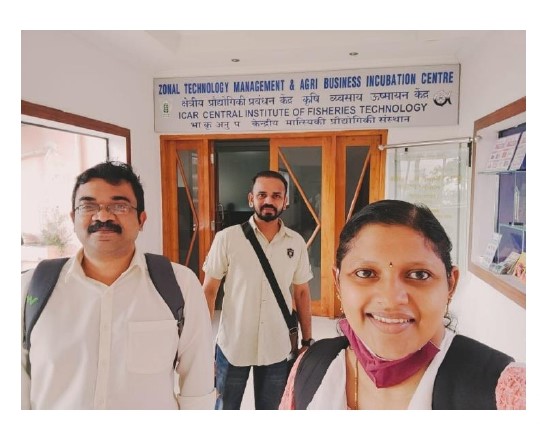Author: Dr. RojithGirindran
In a bid to apply the conventional supply chain and physical auction of the fish with digital technologies, a CIFT incubated company,FERI – Foundation for Environment Research & Innovation has developed two e-trading platforms for digital transformation of fisheries supply chain.Dr.RojithGirindran, Founder Director & Research Scientist, Principal Investigator, Resinnov Blue project, Foundation for Environmental Research and Innovation talks to AQUA POST in detail about the e-auction space that has been made by Ressinov blue to improve the conventional supply chain in a phased manner.
Q.Please tell us briefly about the ‘Resinnov Blue’ project.
Ans:The ‘Resinnov Blue’ is a social entrepreneurship model project of ‘Foundation for Environmental Research and Innovation’ (FERI), a registered trust operated from Kochi, Kerala. The projectis undertaken by a group of researchers to bring digitaltransformation of the national fisheries supply chain along with integration of quality practices. The project being incubated through Agri Business Incubation (ABI) Centre of ICAR – Central Institute of Fisheries Technology (ICAR – CIFT), Kochi focus to commercialize lab level research to market level. Dr. RojithGirindran is the Principal Investigator & Research Scientist of the project while Dr. Rakesh V.B and Dr.Dhanya Joseph are the other two Research Scientists of FERI Trust associated with the Resinnov Blue project.FERI Trust has the expertise to develop novel digital technologies, while ICAR – CIFT have significant technologies to assess the supply chain quality and the integration of both could bring positive changes to the fisheries sector. The Director of ICAR – CIFT had recently launched a first of its kind national online fish auction platform and another e-platform for fish retailers developed through the incubated project ‘Resinnov Blue’. The project provides collaboration opportunities to various stakeholders and organizations towards execution as well as upscaling of the technologies pan India.
Q. What are the major challenges in the fish supply chain?
Ans:India has 3,288 marine fishing villages and 1,511 marine fish landing centers, with a total of about 4 million marine fisher folkpopulations besides fish farmers. Inspite of the splendid resources, the market linkages of the national fisheries supply chain could not be considered as efficient and require significant modernization.Despite the fisheriesexport earnings of USD 7.76 billion (around 63,000 crore INR) for FY 2021 -22 for the nation, the fact that around 67% of fishermen communities still liveunder the Below Poverty Line (BPL) category points out theneed for alternative approaches to enhance the livelihoods and income of the fishing communities.The fishermen who are the primary stakeholders of the supply chain, faces multiple adversities such as climate change, increased scouting due to fish stock changes, and higher input costs, but have to sell their struggled catches at landing centres or harbours through physical auctions, often for meagreprice, which hinders the socio-economic progress of the fishermen communities. The physical fish auction system at harbours and landing centres often fail to provide effective market linkages and deserved catch price for the fishermen communities. In Kerala, recently multiple instances of fishermen strikes have been reported demanding improvement in the auction system to gain better pricing for the struggled fish catch. Meagre prices for fish catch are of concern for fishermen communities of other coastal states also. Many of the human rights, including decent pay for the fish workers, are often deprived, which could be attributed to the supply chain economics. Though fishermen use advanced geospatial tools in fishing boats for navigation and locating fishing grounds, the familiarity with e-trading and e-commerce are naive.
Paradox exists as high fish price for the end consumers and low income for the fishermen. The profits are being shared within the supply chain and process. As fish is a major nutrition source to common man, soaring price is not an appreciable trend. Quality of fishes in supply chain is an important area of concern. Often domestic customers get fishes that are exposed with toxic chemicals and stored for long. Only certain portions of the customers could make out to harbours to get comparatively fresh fish and usually most of the customers are availing frozen fishes or low-quality fishes served through the conventional supply chain. Our perception is that branding is not a proof of quality and system should evolve wherein customers could check or feel the quality of fishes, beyond the dependency on costly brands.

(Research Scientists of Resinnov Blue: (Right-Left) Dr.RojithGirindran, Dr.Rakesh V.B and Dr.Dhanya Joseph)
Q. There are a lot of online marketplaces/e-commerce platforms in the fisheries/seafood sector. What kind of solutions are you bringing in when it comes to the fish market?
Ans: We are here not to create an additional supply chain. Our focus is to improve the conventional supply chain in a phased manner. Modernisation of the conventional supply chain with digital technologies through exploration of new market avenues are among the key goals. An online fish auction platform and another for upgradation of fish shops has been developed and launched. The stock quality checks will be performed in the supply chain through ICAR – CIFT technologies.
Online Auction platform could be a supplement or alternative to the physical auctions at landing centres, wholesale trade centres or fish farms. Fish farmers, fishermen, boat owners, auctioneers, wholesalers and retailers can be the stakeholders of the online auction platform. This is the first national instance of introducing Online Auction platform capable of multiple types of auctions for the Indian fisheries sector. Total four types of auctions are integrated in this platform. Incremental, Reserved and Automatic mode of auctions are made available for the sellers, whereas Reverse Auction feature is provided exclusively for the buyers to get competitive bids from multiple sellers for bulk orders. Auction duration could be set to several minutes, hours or days.
The e-commerce website developed for fish retailers enables the regional shops to have their online presence near the customer’s location. The website makes use of the O2O (Online to Offline) commerce concept, where in online customers shall be attracted to make purchase through nearby physical fish shops with options for home delivery of cleaned fishes. The retailers could avail their quality checked stocks through the developed online auction platform.
Q. How can technology be used to discover better prices for fish farmers?
Ans: The digital transformation initiative for fisheries supply chain envisage to solve the low catch price concerns for the fishermen communities, as well as focus to develop demand cluster through network of digital retailers for effective market linkages and quality assurances. Physical auctions inherit the problem of sales options restricted to few stakeholders physically present at the harbour, whereas the online auction platform extends the reach to more buyers beyond the physical boundaries. During our field surveys, the fishermen of Chellanam fishing village, Kochi expressed interest to be part of the online trading options, so that it shall address their concerns of low price for the fish catch. Fish farmers could also be on-boarded in this digital platform, so that they could negotiate better with more buyers from multiple locations.
Many fish retailers are willing to be onboarded to the digital network, so as to upgrade their competence and sustenance. Lack of brand support, quality assurance of fish stocks and non-familiarity with the e-commerce platforms are among the issues faced by the small-scalefish retailers, which shall be resolved through the project intervention. In return, the shop owners shall purchase their stock through the e-platforms, so that the primary stakeholders such as fishermen or fish farmers could have better price margin. Based on the value generation (financing, warehousing, and logistics) other stakeholders such as auctioneers, wholesalers and agents could also have their fixed profit margin through the e trading platforms. The digital interventions could facilitate more freedom of sales, responsible sourcing and quality checks in the fisheries supply chain. The Resinnov Blue project shall take efforts to popularize the technology within the sector in collaborative mode with regional entrepreneurs.
Q. Have you developed any technology that lets consumers check the quality of the fish? Please elaborate.
Ans: For the Resinnov Blue project, we will be availing quality assessment technologies and procedures of ICAR – CIFT that have been already developed by them internally. ICAR – CIFT could play a key role to ensure quality practices throughout the supply chain in a phased manner. The technologies and procedures such as sensory attribute assessment procedures, ranking method and rapid detection kits could be handy in supply chain checks. Consumers could also check the quality of the fish as they get familiarized with the methods.
( THIS IS WRITTEN BY:
Dr. RojithGirindranFounder Director & Research Scientist
Principal Investigator, Resinnov Blue project
Foundation for Environmental Research and Innovation
ABI Centre, ICAR – Central Institute of Fisheries Technology
Kochi, Kerala)





